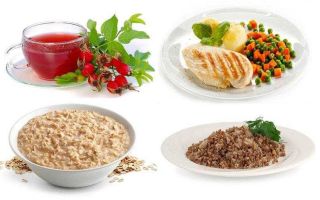Content
Contrary to popular belief, food alone cannot cure disease. A diet for exacerbated gastritis is prescribed to relieve symptoms. Patients conscientious about menu design report significant improvement in symptoms.
Features of nutrition for gastritis during an exacerbation
A special diet has been developed for patients with gastritis. Nutrition for exacerbated gastritis is strictly observed so as not to provoke the development of complications. It is important to exclude from the diet foods that negatively affect the functioning of the stomach and impair digestion.
On the first day of exacerbation of gastritis, you should refrain from taking any food. They drink still water or herbal non-hot teas.
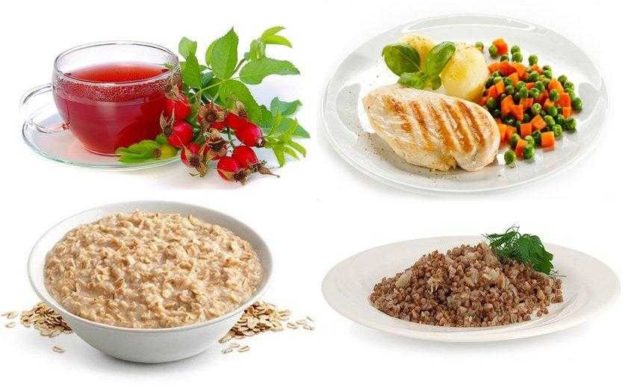
Diet No. 5 with exacerbation of gastritis helps the body to recover. In nutrition, you must adhere to certain rules:
- Eat often, but in small portions. By regulating food intake, the patient controls the production of stomach acid. This is to prevent acute flare-ups of symptoms.
- The more homogeneous and thinner the dish, the better. Food should not irritate the mucous membranes. Dishes are boiled, steamed, rarely baked.
- It is recommended to eat more high-fiber foods.
- Exclude food that causes gas from the diet during exacerbation of gastritis. You should listen to your body to find out which product is causing discomfort.
- Include probiotics in the diet for exacerbation of gastritis and ulcers. They saturate with beneficial bacteria that colonize the digestive system. Probiotics help absorb and digest nutrients.
- Drink enough water. The liquid not only relieves gastritis symptoms, it helps flush out harmful toxins. It is recommended to drink it 30 minutes after eating.
- The last meal is carried out 2-3 hours before bedtime.
- Eliminate spicy and sour foods. It irritates the mucous membrane, provoking the appearance of new symptoms of exacerbated gastritis.
- You can't eat while running. In case of gastritis, it is important to chew food thoroughly, not to swallow it in pieces.
- Avoiding alcohol Whether caused by alcohol, NSAIDs or H. pylori gastritis, it is imperative to avoid ethanol altogether. It irritates the mucous membrane and causes erosion, which leads to a worsening of the symptoms of the disease.
Different foods cause different reactions in people. Knowing which food is causing the symptoms of gastritis will help in the treatment and prescription of the correct dietary table.
Compliance with food with high acidity is required constantly. Especially during an exacerbation, when the mucous membrane is in an inflamed state.
Medical nutrition with exacerbation of gastritis should load the stomach to a minimum.
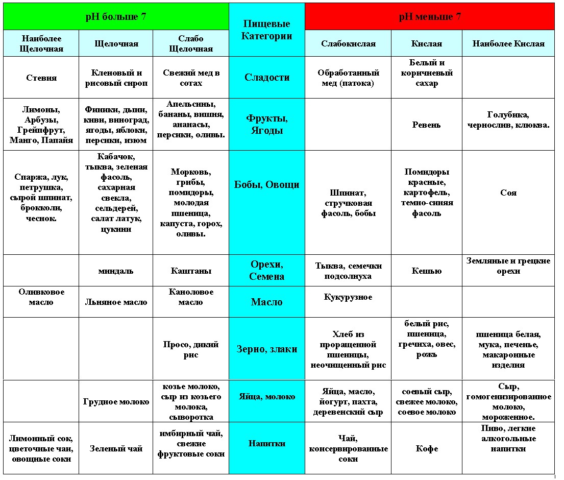
In case of a disease with high acidity, there are more restrictions than a diet in the form of a disease with low acidity.
In the chronic course of the disease, table number 1 is also suitable, such a diet for exacerbation of gastritis is considered tough. It is designed to support the digestive tract and help it recover.
Diet for gastritis during an exacerbation: a list of products
Despite dietary restrictions, the patient's diet is quite varied. The diet during an exacerbation of the disease contains foods with a high energy value and an optimal balance of nutrients.
What can you eat on a diet with exacerbation of gastritis
Food for erosive gastritis during an exacerbation may contain the following foods:
- Matsoni... A study published in the World Journal of Gastroenterology illustrates how fermented milk can increase gel production in the gastric mucosa in mice. This layer reduces the organ's vulnerability, in particular against gastritis. Diet for exacerbation of the disease may include up to 300 ml of yogurt per day.
- Sauerkraut... Lactobacillus Plantarum, the dominant bacterial species in sauerkraut, exhibits anti-Helicobacter properties. Including sauerkraut in a patient's diet for an exacerbated gastritis may help reduce H. pylori activity.
- Garlic known for antibacterial properties. It contains a broad spectrum of antibiotics that are powerful enough to fight off the bacteria that trigger gastritis. Research confirms that regular consumption of shallots, leeks and garlic can reduce the amount of Helicobacter pylori in the stomach.
- Bread... With exacerbated gastritis with high acidity, it is recommended to use yesterday's product. White bread is the safest. Recommended to be consumed dried.
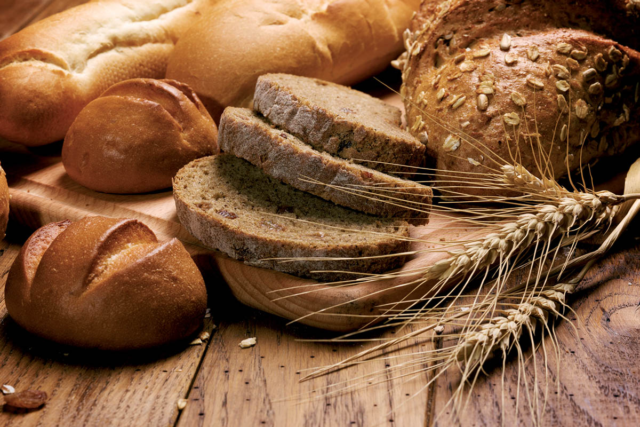 Yesterday's baked goods are better absorbed by the body, with aggravated gastritis, the diet includes barley bread, crackers
Yesterday's baked goods are better absorbed by the body, with aggravated gastritis, the diet includes barley bread, crackers - Apple vinegar... Long-term use of NSAIDs can lead to gastrointestinal imbalances. Drinking apple cider vinegar, a liquid sourced from pressed apples, can reverse the damage from non-steroidal anti-inflammatory drug abuse. It restores balance to the gastrointestinal system. The malic acid present in vinegar alters the acidity. Stabilizes the pH level. Beneficial bacteria are able to multiply again and protect the body.
- Turmeric contains a compound called curcumin. Research has shown that this substance may be a useful adjunct for relieving inflammation and preventing carcinogenic changes in patients with Helicobacter Pylori gastritis. However, caution should be exercised as curcumin causes gastritis when taken on an empty stomach. Hence, it is best to consult a doctor.
- Oregano... Adding leaves and oil to your diet can help relieve gastritis pain and other symptoms. Research shows that oregano's antimicrobial effects can suppress and kill H. pylori. It has antispasmodic properties that relieve nausea and vomiting, as well as indigestion and diarrhea, which can be a side effect of antibiotics.
- Cranberry juice inhibits the growth of Helicobacter pylori. Patients should consume cranberries as well as other foods that contain flavonoids if gastritis worsens.
- A pineapple - Another fruit that can either positively affect the course of gastritis, or increase acid reflux, depending on tolerance and sensitivity. The bromelain in pineapples has anti-inflammatory, analgesic, antibacterial, and anticancer properties.
- BIt has been shown that the consumption of beets, carrots or juice helps to eradicate Helicobacter pylori. Vitamin A in carrot juice helps prevent the destruction of the mucous membranes.
- Honey contains many compounds that reduce inflammation of the gastrointestinal tract and promote the healing of ulcers that occur on the mucous membrane. It also has antibacterial activity against H. pylori and may help treat gastritis.
Food for exacerbation of gastritis also includes fat-free cookies, lean meat and fish, steamed omelets, glands, not strong tea, cereals, purees, light broths or milk soup, mineral water and rosehip broth.
Foods that kill the H. pylori bacteria are broccoli and yogurt. This information comes from a 2009 study published in the journal Cancer Prevention Research. People who ate 1 cup of broccoli sprouts a day for 8 weeks experienced less discomfort compared to those who did not.
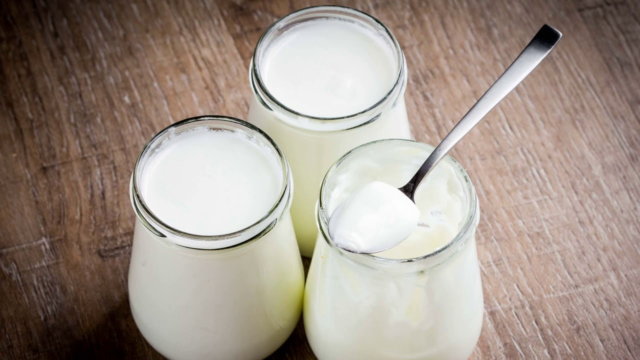
Yogurt contains active cultures of beneficial bacteria, which improves the body's ability to fight unwanted microorganisms in the stomach.
Broccoli contains a nutrient called sulforaphane. Research shows that this vegetable contains an interactive strain that helps fight H. pylori bacteria, including antibiotic-resistant antibiotics. The product can be included in the diet of patients with stomach tumors caused by benzopyrene.
What you can't eat on a diet with exacerbation of chronic gastritis
Diet is the leading one in the complex treatment of the disease. When compiling it, acidity is taken into account. The diet menu for gastritis in the acute stage is strict, excludes the following foods:
- Milk, cheese, cream (other than organic yogurt) contain calcium and amino acids that increase stomach acidity. This, in turn, increases acid reflux. Milk covers the mucous membrane with a thin film, providing temporary relief by buffering the released acids. Their production may even increase subsequently, causing severe discomfort.
- Citrus fruits and juices contain vitamin C, which prevents the formation of ulcers. It scavenges free radicals and reduces inflammation, especially those caused by H. pylori. They are allowed to use it in the initial stages of the disease. If gastritis is chronic, then the diet excludes their use.
- Tomatoes irritate the stomach lining and can cause ulcers if gastritis is present. It's best to try eliminating all acidic foods and then adding them back in remission to see which ones affect the stomach.
- Alcohol destroys the lining of the stomach, leaving it unprotected from corrosive acids such as hydrochloric acid, which is secreted to digest food.
- ABOUTold products do not cause gastritis, but their use, worsen the symptoms of the disease.
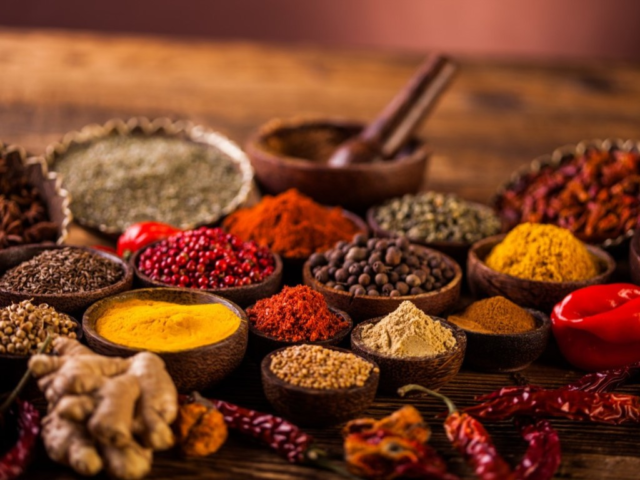 Foods containing chili powder, garlic powder, black and red peppers, hot peppers and other hot spices should be avoided
Foods containing chili powder, garlic powder, black and red peppers, hot peppers and other hot spices should be avoided - Corn... The cellulose content is high, which can cause significant gastrointestinal problems. The human digestive tract cannot break down cellulose, and it passes right through the system undigested. It can remain in the stomach and rot, creating a breeding ground for harmful bacteria. It is recommended to exclude corn and related foods from the diet if gastritis is present.
- Wheat, wheat germ, rye, barley, graham flour, kamut matzo, bulgur, couscous, semolina, spelled and bright contain gluten, which causes stomach problems. It also causes inflammation in the stomach and intestines.
Attention! Hamburger burgers, ready-to-eat meals, and store-bought deep-fried foods can trigger bouts of stomach pain caused by chronic gastritis. They create an acidic environment. Therefore, the diet excludes their use.
- Sweets can irritate the stomach lining. They contain sugar that promotes the growth of harmful bacteria in the stomach, creating a healthy environment for them.
- Coffee has a significant effect on the digestive system. It worsens gastritis symptoms and increases acid reflux.
- Energy drinks are high in caffeine and, if consumed in excess, can cause digestive problems. They cause inflammation, bleeding, pain, and ulcers. Caffeine in drinks increases the production of stomach acids, which in turn leads to heartburn. It also irritates the intestinal mucosa.
Diet menu for exacerbation of gastritis for a week
The meal plan is made individually for each patient. A diet with an exacerbation of the disease is prescribed by a nutritionist or gastroenterologist. In the stage of remission, the diet is gradually expanded.
Diet for gastritis during an exacerbation - menu for a week:
- Monday... Breakfast - watermelon juice + 1 slice of whole grain bread with low-fat cottage cheese and egg. Lunch - 4 tbsp. l. brown rice + stewed vegetables + chicken breast with tomato sauce. Afternoon snack - whole grain yogurt + 1 tablespoon honey + 1 tablespoon oats. Dinner - fish broth, vegetable stew.
- Tuesday... Breakfast - 1 cup of beetroot juice + 2 omelets with cheese + 2 slices of papaya. Lunch - 1 boiled fish fillet, buckwheat, yogurt. Afternoon snack - 2 slices of whole grain bread with cottage cheese and egg. Dinner - red fish baked with milk sauce, tea with milk.
- Wednesday... Breakfast - banana puree with 1 tablespoon of oats. Lunch - pasta with tuna and pesto sauce + green salad. Afternoon snack - natural jelly. Dinner - vegetable soup with meatballs, rosehip broth.
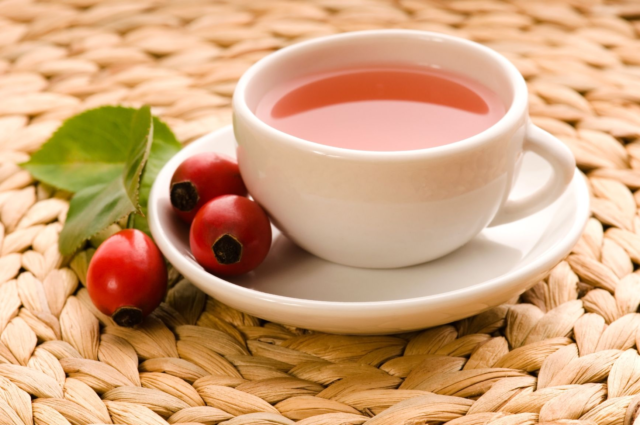 To prepare a rosehip decoction, you will need 100 g of dry berries, 1 liter of water, 50 g of sugar, cook the mixture for 10 minutes after boiling
To prepare a rosehip decoction, you will need 100 g of dry berries, 1 liter of water, 50 g of sugar, cook the mixture for 10 minutes after boiling - Thursday... Breakfast - poached egg, rice porridge and tea. Lunch - chicken barley soup, fruit mousse. Afternoon snack - cottage cheese casserole with pumpkin. Dinner - squash casserole and chicken meatballs.
- Friday... Breakfast - scrambled eggs with milk. Lunch - steam cutlets, buckwheat porridge, rosehip broth. Afternoon snack - zucchini stewed in sour cream. Dinner - fish balls + mashed potatoes.
- Saturday... Breakfast - oatmeal on water with apples. Lunch - hake soup, risotto with pumpkin. Afternoon snack - jelly. Dinner - cutlets with buckwheat.
- Sunday... Breakfast - rice porridge, fruit jelly. Lunch - chicken broth, Greek people. Afternoon snack - fruit jelly. Dinner - carrot puree, barley porridge and raspberry jelly.
It is recommended to eat porridge for breakfast. They are nutritious, contain complex carbohydrates and keep you full for a long time.
Diet during exacerbation should be as varied as possible. It is important to provide the body with all useful substances. A healthy drink to include in your diet:
Conclusion
Diet during exacerbation of gastritis helps prevent bleeding, ulcers and even stomach cancer. It is important to take care of yourself in the early stages, when symptoms are just beginning to bother you.

